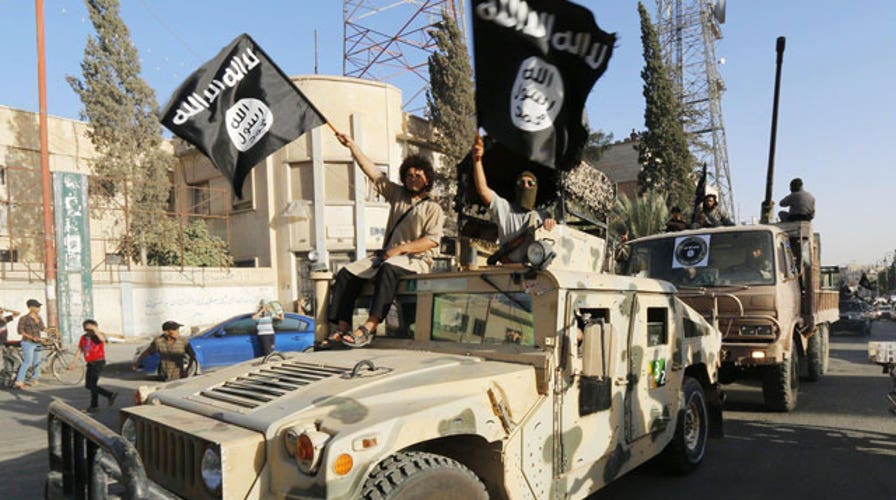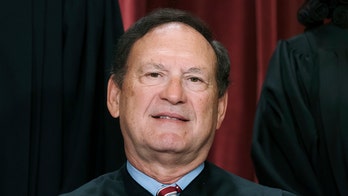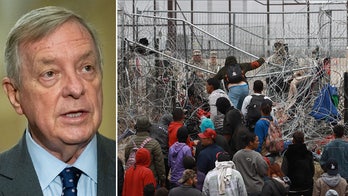Is US going too far with possible ISIS airstrikes in Syria?
Daveed Gartenstein-Ross on how the West can effectively contain the extremists
The U.S. has started flying surveillance drones over Syria after President Obama authorized the missions, two senior Defense officials told Fox News, in a move that could pave the way for eventual airstrikes against Islamic State targets in the country.
A decision still has not been made, at least publicly, to launch airstrikes in Syria. But the Obama administration would likely need additional intelligence on possible targets should the president take that step.
Sources told Fox News that Obama approved surveillance missions in Syria for the first time over the weekend; they have since begun.
It remains to be seen whether the Syrian government will raise any objections to the move. On Monday, the Syrian regime demanded that the U.S. seek permission before launching any airstrikes on its territory against Islamic State targets, but did not discuss its position on surveillance drones.
The internal discussion over whether to expand the U.S. mission into Syria comes after the U.S. military earlier this month began launching a volley of strikes against Islamic State targets in northern Iraq. Top Pentagon officials have said that the only way the threat from the militants can be fully eliminated is to go after the group inside neighboring Syria as well.
Army Gen. Martin Dempsey, chairman of the Joint Chiefs of Staff, told reporters in Kabul, Afghanistan, on Tuesday that the U.S. wants more clarity on the militants in Syria, but declined to comment on the surveillance flights.
"Clearly the picture we have of ISIS on the Iraqi side is a more refined picture," said Dempsey, using one of the acronyms for the Islamic State group. "The existence and activities of ISIS on the Syrian side, we have ... some insights into that but we certainly want to have more insights into that as we craft a way forward."
The action is considered the first “intrusive” surveillance by the U.S. in Syria since the country’s civil war began. This differs from protective surveillance, such as the U.S. used in the failed mission to rescue American hostages held in Syria.
The authorization was first reported by the Wall Street Journal.
"There is no decision yet to do strikes, but in order to help make that decision, you want to get as much situational awareness as possible." a senior U.S. official told the Journal.
The news comes amid a back-and-forth between Syria’s government and the Obama administration over the possibility of the U.S. launching airstrikes in the country.
The Assad regime on Monday demanded the Obama administration seek permission before launching any airstrikes on its territory against Islamic State targets, while the State Department indicated it had no intention of seeking "the approval of the Syrian regime."
The question of whether the White House should authorize airstrikes has grown in urgency in recent days -- particularly after Islamic State militants last week beheaded an American journalist captured in Syria.
Other clashes were also erupting in the region, including warnings that another northern Iraq town faces the risk of a "massacre" at the hands of the Islamic State and apparent airstrikes by Middle Eastern militaries on Islamist militias in Libya.
U.S. military officials have given mixed messages on how seriously airstrikes in Syria are being considered, saying most recently they would only be used to counter a threat to the U.S.
But Syria seemed intent on capitalizing on the growing clamor among some U.S. officials to expand the current American air campaign -- provided the Syrian government is a partner.
Speaking in Damascus, Syrian Foreign Minister Walid al-Moallem appeared acutely aware of how much has changed since last August, when the U.S. was threatening to carry out punitive airstrikes against Bashar Assad's government in the wake of the chemical attack. Since then, global disapproval has shifted away from Assad and toward the Islamic extremists who are fighting him and spreading destruction across Syria and Iraq.
Al-Moallem told reporters his government is ready "to cooperate and coordinate" with any side, including the U.S., or join any regional or international alliance against the Islamic State group. But he said any military action inside Syria should be coordinated with the government, "which represents Syrian sovereignty."
"Any strike which is not coordinated with the government will be considered as aggression," he said.
He said Damascus repeatedly has warned of the threat of terrorism and the need to cut off resources and funding, but "no one listened to us." Syria's government has long described the rebels fighting to topple Assad as "terrorists" in a foreign conspiracy.
The Obama administration has bristled at the thought of teaming up with the Assad government, while acknowledging they might have enemies in common.
"Just because the Syrian regime may be taking on ISIL or ...speaking publicly about that, and certainly the United States is, it certainly doesn't mean we're on the same side of the coin here," State Department spokeswoman Jen Psaki said on Monday.
Asked specifically whether the U.S. would have permission to act in Syria, she said: "I think when American lives are at stake, when we're talking about defending our own interests, we're not looking for the approval of the Syrian regime."
Fox News' Jennifer Griffin and The Associated Press contributed to this report.





